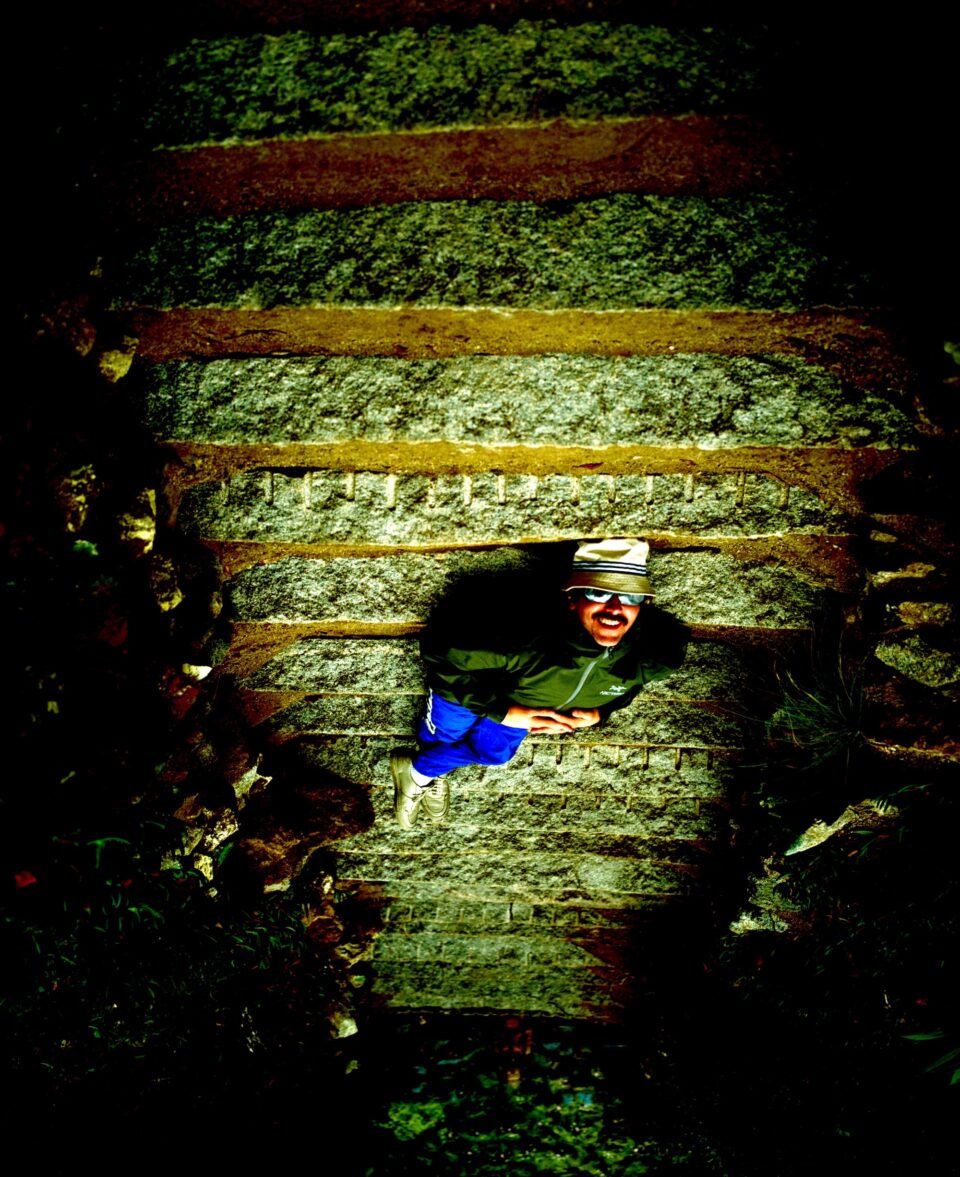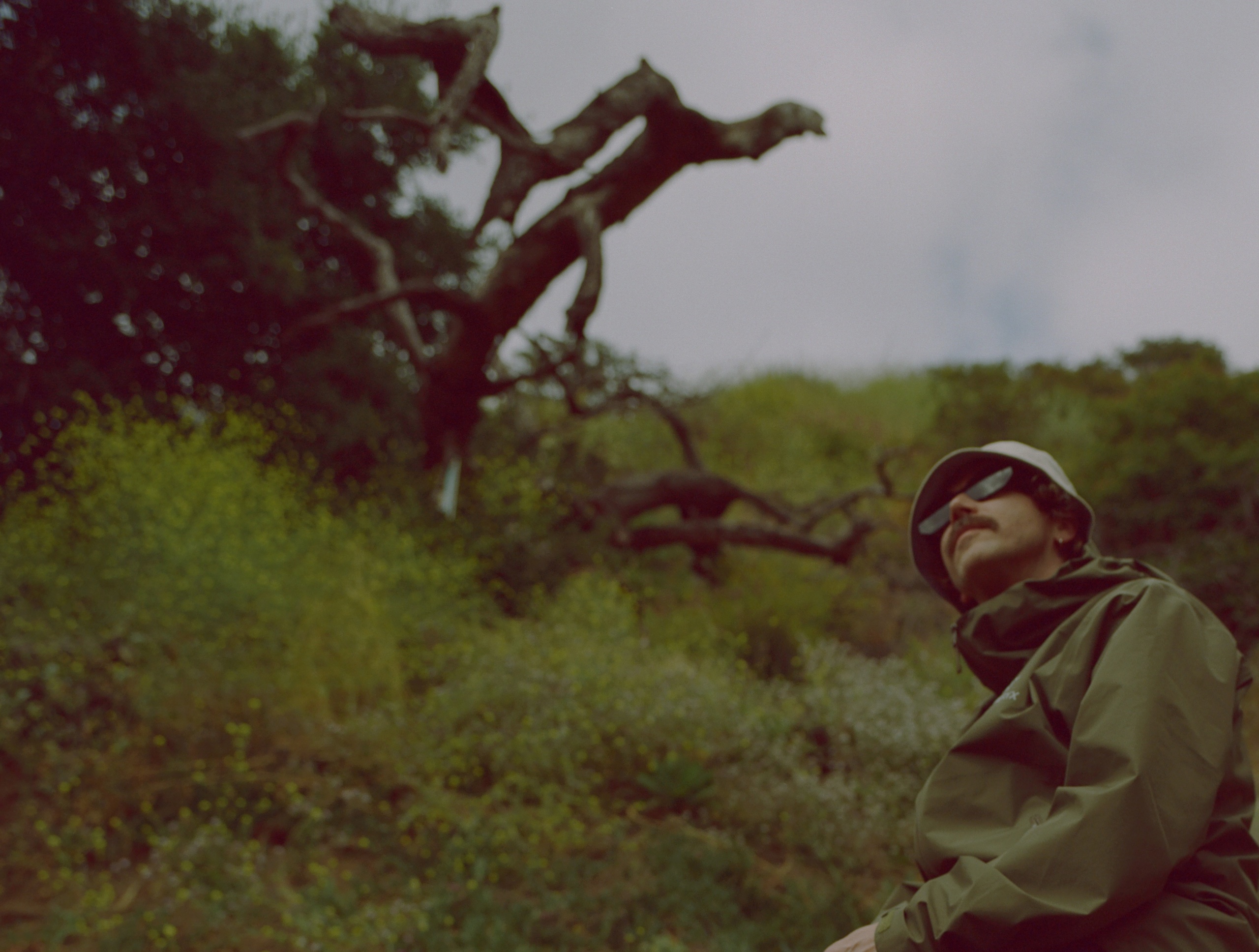The Buddha Trail is not especially treacherous by Alaska standards. It’s a small dirt path in a meandering 50-acre park in the heart of Los Angeles, just up the road from Hollywood Boulevard, and it leads uphill to a Buddha statue standing with hands firmly in prayer. On a sunny afternoon in May, the park is mostly empty, and hiking up towards the shrine is John Baldwin Gourley, the singer and ringmaster for the band Portugal. The Man, moving through the brush with a small entourage of perspiring band members, their manager, a publicist, and others for an outdoor photo shoot.
As he nears the Buddha, Gourley stops to climb atop a torii Japanese gateway, a simple red structure symbolizing a pathway to the divine. In his white bucket hat and dark mustache, with an olive-green windbreaker zipped up to his chin, Gourley smiles and looks skyward as a photographer captures the scene. “Music’s made up of extreme introverts and extreme extroverts,” Gourley says later. “You’re either terrified of everything or class clown.”
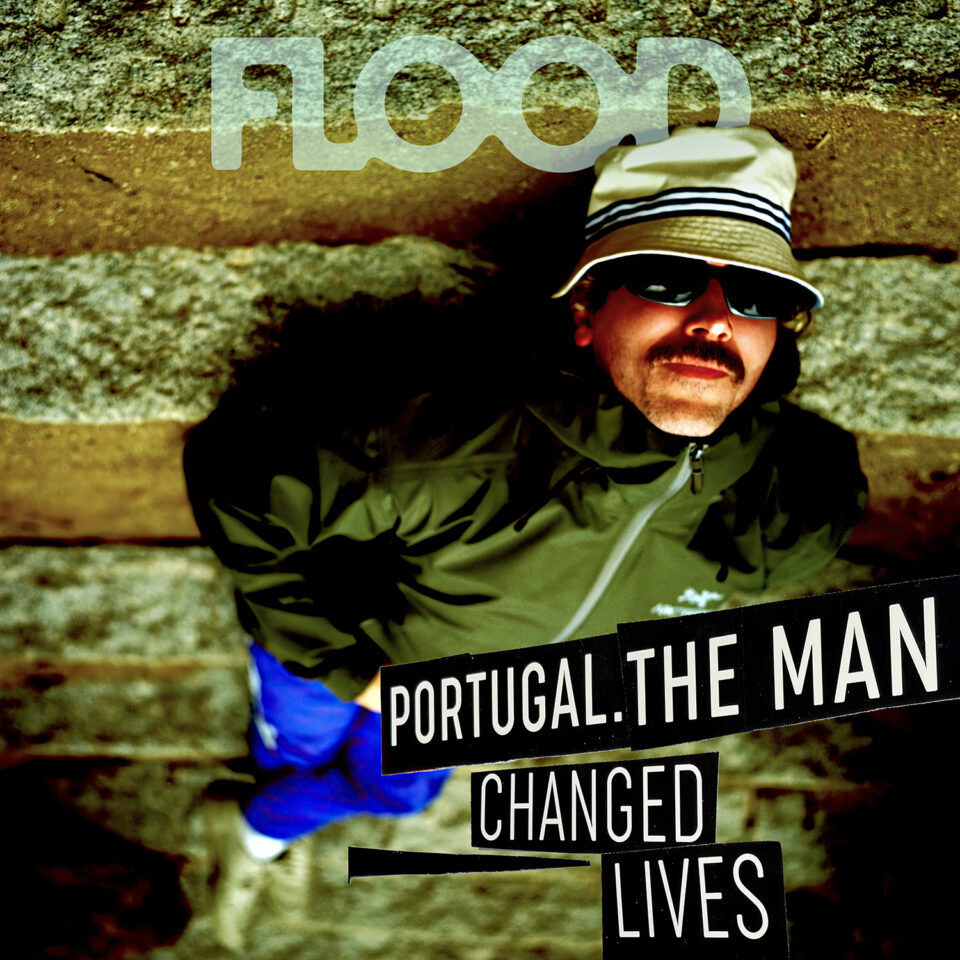
Gourley is a rock musician who manages a balance of both, but the outdoor surroundings are no problem for the singer. Wattles Park is a fairly wild, rough-edged tract for a city park, and Gourley was born in tiny Willow, Alaska (current population: under 2,000). He grew up all over the 49th state, a.k.a. “The Last Frontier,” “The Land of the Midnight Sun,” or Alyeska in indigenous Aleut, a place known for its extreme cold and wandering grizzlies. He and his brother moved around Alaska frequently with their parents, who were veteran Iditarod sled dog racers, and had the epic wilderness as their backyard.
The state is now also known to outsiders for spawning this weird confab called Portugal. The Man, a group newly discovered by a large mainstream audience with their 2017 multiplatinum hit single, “Feel It Still,” from that year’s million-selling Woodstock album. With a melody openly lifted from the Marvelettes’ 1961 pop song “Please Mr. Postman,” the song reached No. 4 on the Billboard Hot 100 and was awarded a Grammy for Best Pop Duo/Group Performance. It was a major hit around the world. Strange stuff for a band of musical pranksters from Alaska with seven albums already behind them.
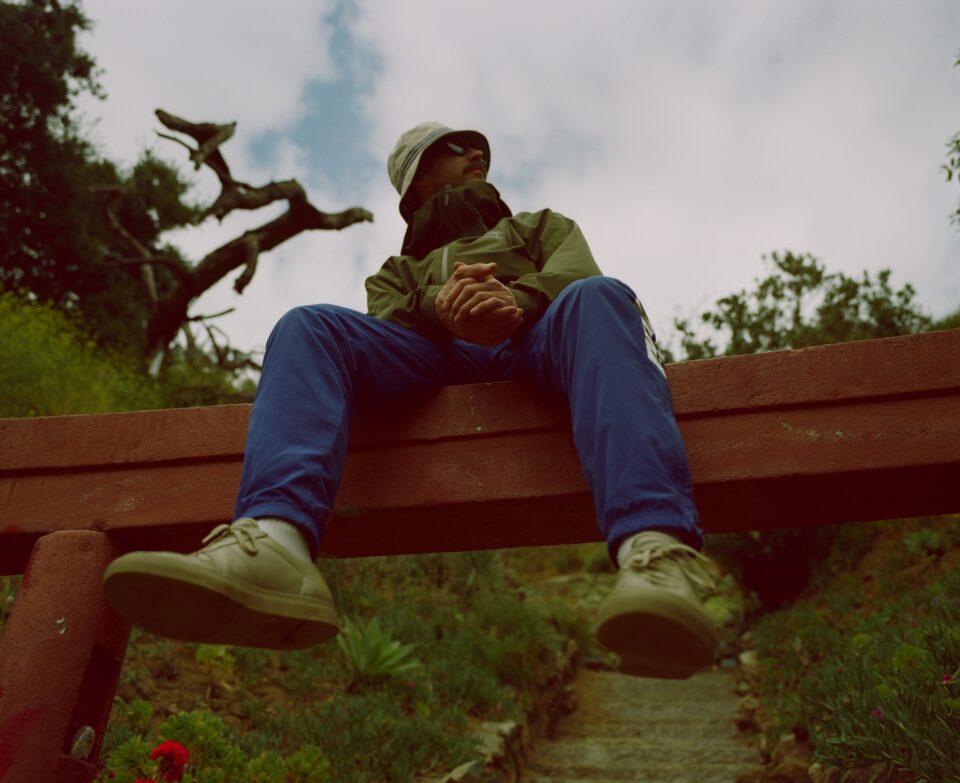
If Gourley were to right now look down into the gorge from his perch on the torii crossbeam, he would see band keyboardist Kyle O’Quin and the singer’s wife (and bandmate) Zoe Manville far below. Together, and with the help of many other collaborators, they recorded PTM’s newest album, Chris Black Changed My Life, another collection of songs playful and deep, built with classic pop and danceable indie rock, big questions and puzzling answers.
First out into the world was the single “Dummy,” a bouncy tune of postmodern rock, with lyrics about facing the darkness and inevitable doom with good cheer. The sweet, hook-filled chorus offers a message hopeful and utterly grim: “One two three four/Everybody get on the dance floor/Five six seven eight/I pray the lord my soul to take/My light is going out/The light in my life is going out.”
“Music’s made up of extreme introverts and extreme extroverts. You’re either terrified of everything or class clown.”
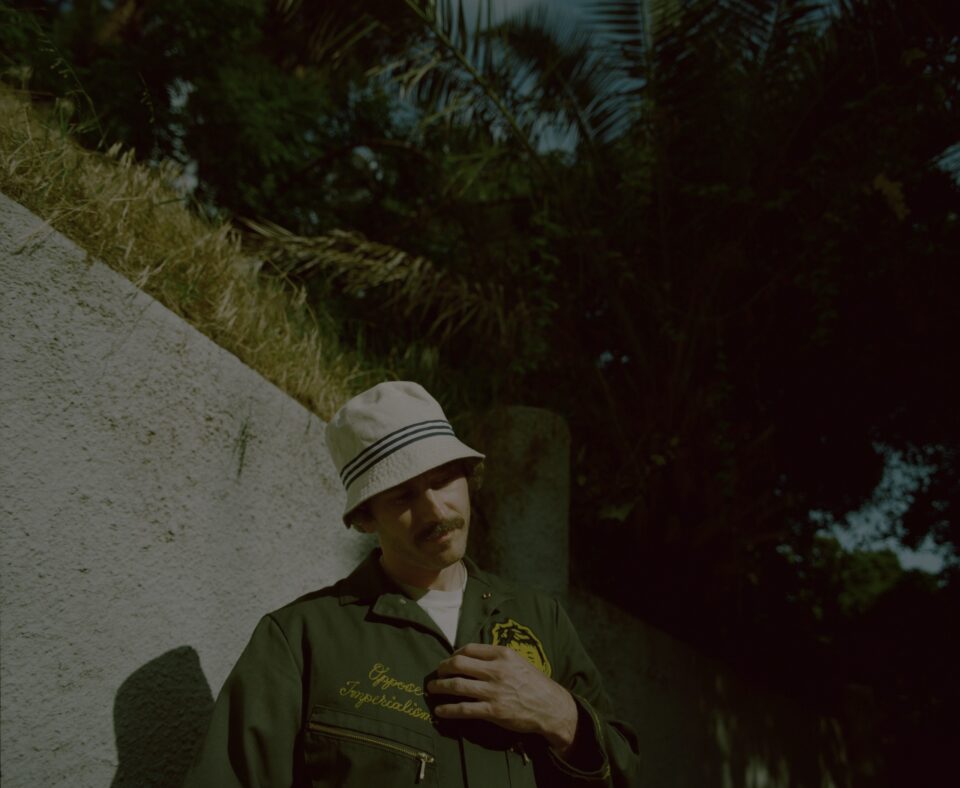
A lot of the album is like that, starting with the album title, named for the close friend and honorary band member Chris Black, who was an essential part of the Portugal. The Man crew and its biggest booster, grabbing the mic to act as coach or hype man for his favorite band in the world. He was their personal MC and DJ, a hilarious dude with excellent taste in records and people. Then one day, on May 19, 2019, he died from a lifelong heart ailment he’d neglected to mention to anyone. Calling the album Chris Black Changed My Life is about making a statement of fact. It’s also a way to keep the man present.
His passing was one indication of the dark times in the here and now. Another came on strong at the end of 2018, as Gourley found himself suffering with intense jaw pain. The dentist old him it was just a bad case of TMJ. No worries. Then one night, as he was at home massaging his jaw through some pain, there was a loud pop in his head. There was damage to his mandible, with jagged edges digging back into his skull.
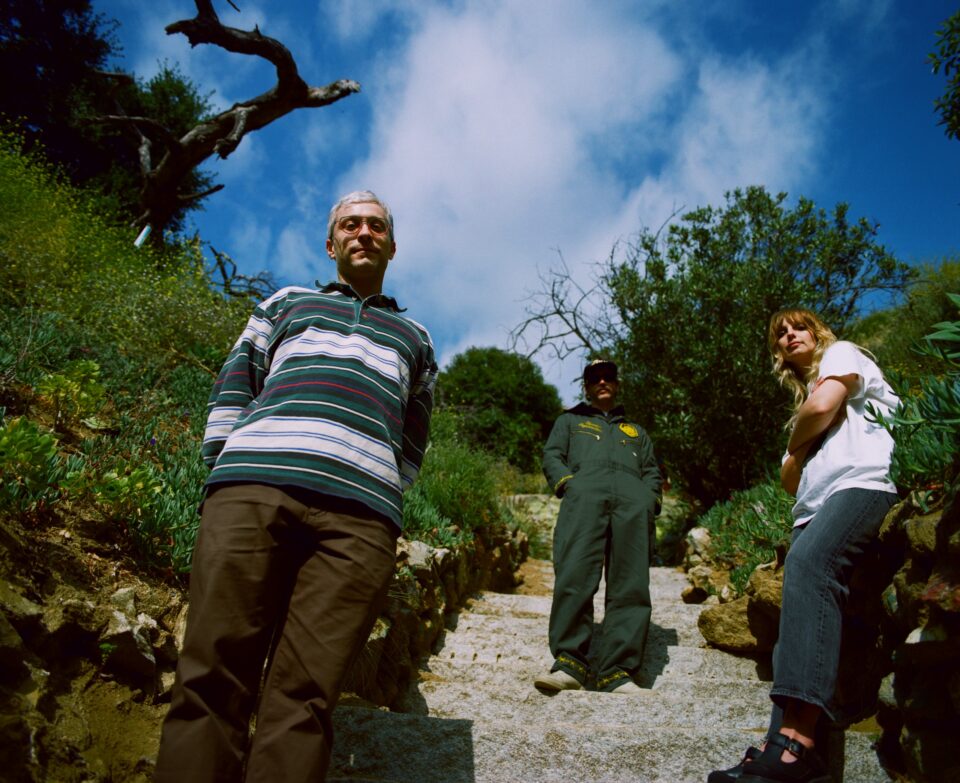
His doctor told him it was connected to a broken jaw from childhood that Gourley somehow never noticed. “We were reckless Alaskan kids, dude,” the singer says now. “You fall off the dirt bike, you get back on it.”
The band kept playing live through the end of 2019. Then the Covid-19 pandemic forced him to take the break he needed to heal. Things got worse before getting better. “I didn't think I was ever going to sing. I was lying in bed in pain,” Gourley says. “Like, I don't think I can do the thing that I've always done. What am I gonna do? Existential crisis.”
“I didn't think I was ever going to sing. I was lying in bed in pain. Like, I don't think I can do the thing that I've always done. What am I gonna do? Existential crisis.”
With treatment, and a protective piece of resin that he wore between his teeth to keep his jaw from clenching shut, things began to improve. He traveled to Los Angeles to begin recording again, and the first song he worked on was “Doubt,” a self-explanatory title to reflect the moment, with lyrics that begin: “Life is a dead end/Full of doubt/But I keep my head up/In the clouds.”

Zoe Manville
That was only the beginning. While the new album was in progress, he and Zoe learned that their 11-year-old daughter, Frances, was diagnosed with an extremely rare genetic mutation, abbreviated as DHDDS. (Full name: dehydrodolichyl diphosphate synthase subunit.) She is one of only a handful of people in the world known to have the degenerative disease. That revelation landed the same night they recorded “Time’s a Fantasy,” a dramatic ballad, heavy with piano and vocal effects. And Frances herself is in the mix of voices singing at the end, “Got a feelin’ that things are gonna be just fine.”
“I don't think I've ever really had such an emotional and vulnerable moment in the studio as we did during this album.”
An online campaign to raise funds for Frances’s treatment and to support research into the condition was launched here.
“I don't think I've ever really had such an emotional and vulnerable moment in the studio as we did during this album,” Gourley explains, “but there's so many things happening in our lives right now.”
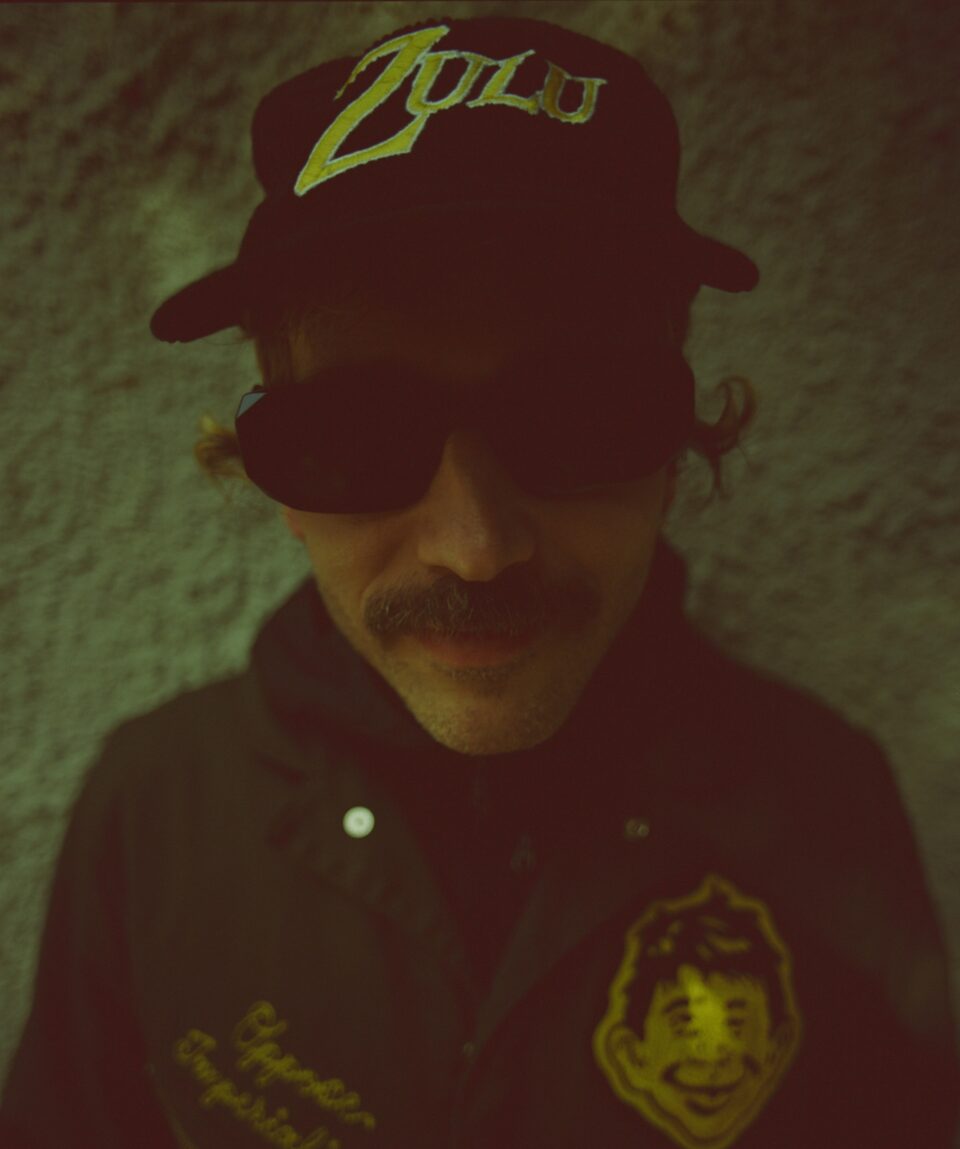
After a quick wardrobe change at the park, Gourley is now dressed in a jumpsuit with Mad Magazine’s Alfred E. Newman on his chest and anti-war messages stitched front and back. In big block letters between his shoulder blades, it reads: “War is a racket.” “We’re one of those rare antiwar bands,” he says with a laugh. Soon he’s posing on the stone steps leading to the Buddha with Zoe and Kyle.
All over the shrine, visitors have left messages and small tokens for the statue. There are coins, drawings, a tiny piñata in the shape of a horse, a koinobori carp-shaped kite hanging from the brush. On a rock, someone has left a pin with the face of Jack Skellington from The Nightmare Before Christmas. And right beside it is another button with Nirvana’s song title “Come as You Are.” It so happens that in 1992 Nirvana shot part of a music video for the song in this park with filmmaker Kevin Kerslake. And it’s Kerslake taking these photos of Gourley and the band right now.
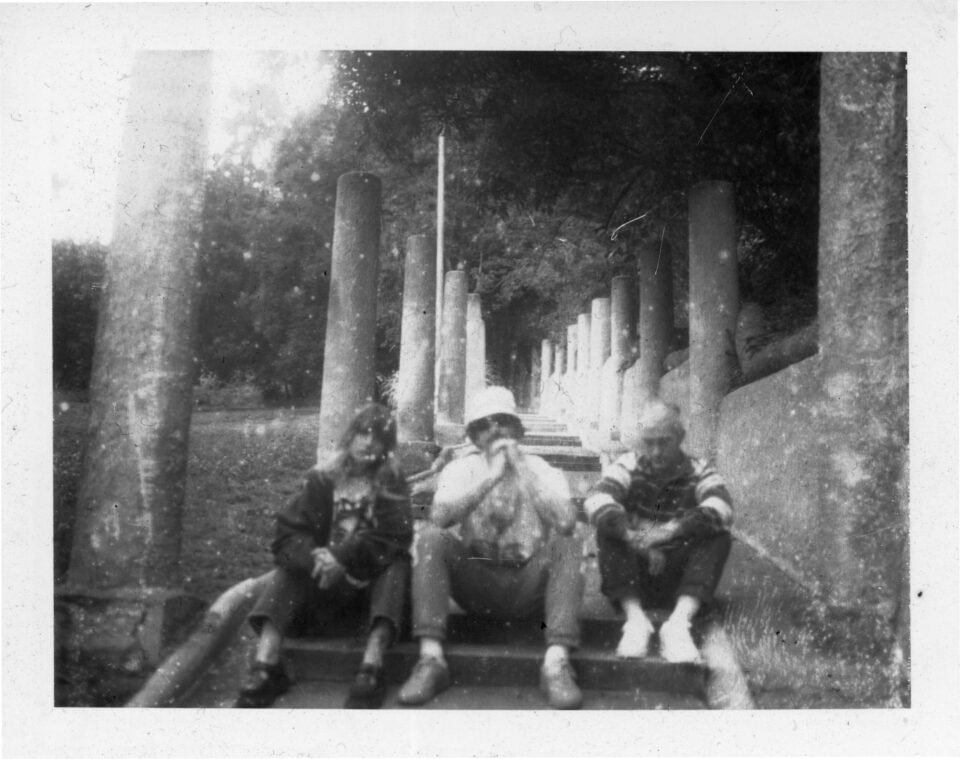
Gourley was once a shy kid with social anxiety, but he’s learned to embrace the public side of his role as frontman. And having his picture taken was always part of the gig, as it has been for generations of his favorite artists. “I would pick up magazines and flip through and it was my favorite thing,” he remembers of his childhood. “I love seeing the person that makes the music and trying to see where it all comes from.”
The last album, Woodstock, was the result of a long struggle, trial and error. The band wrote a mountain of songs, and worked in multiple studios with different producers, including Danger Mouse and Mike D of the Beastie Boys. Gourley spent his days creating, but got endlessly distracted by the competing songs-in-progress happening all at once. “I'm ADD, man. It's not how my brain works,” Gourley says. “I can't go pop from one studio to the next. I have a really specific way I do things: ‘Okay, I got the first song done. Now I'm gonna write the next 12 or 13 in the next two weeks.’ That’s usually how it works. I'm looking for that one song that shows you the direction of the record and informs the rest of the album.”
"An album is a snapshot in time of this moment and this life and this experience. Let it bleed into each other. Don't be so precious. Cannibalize all of it.”
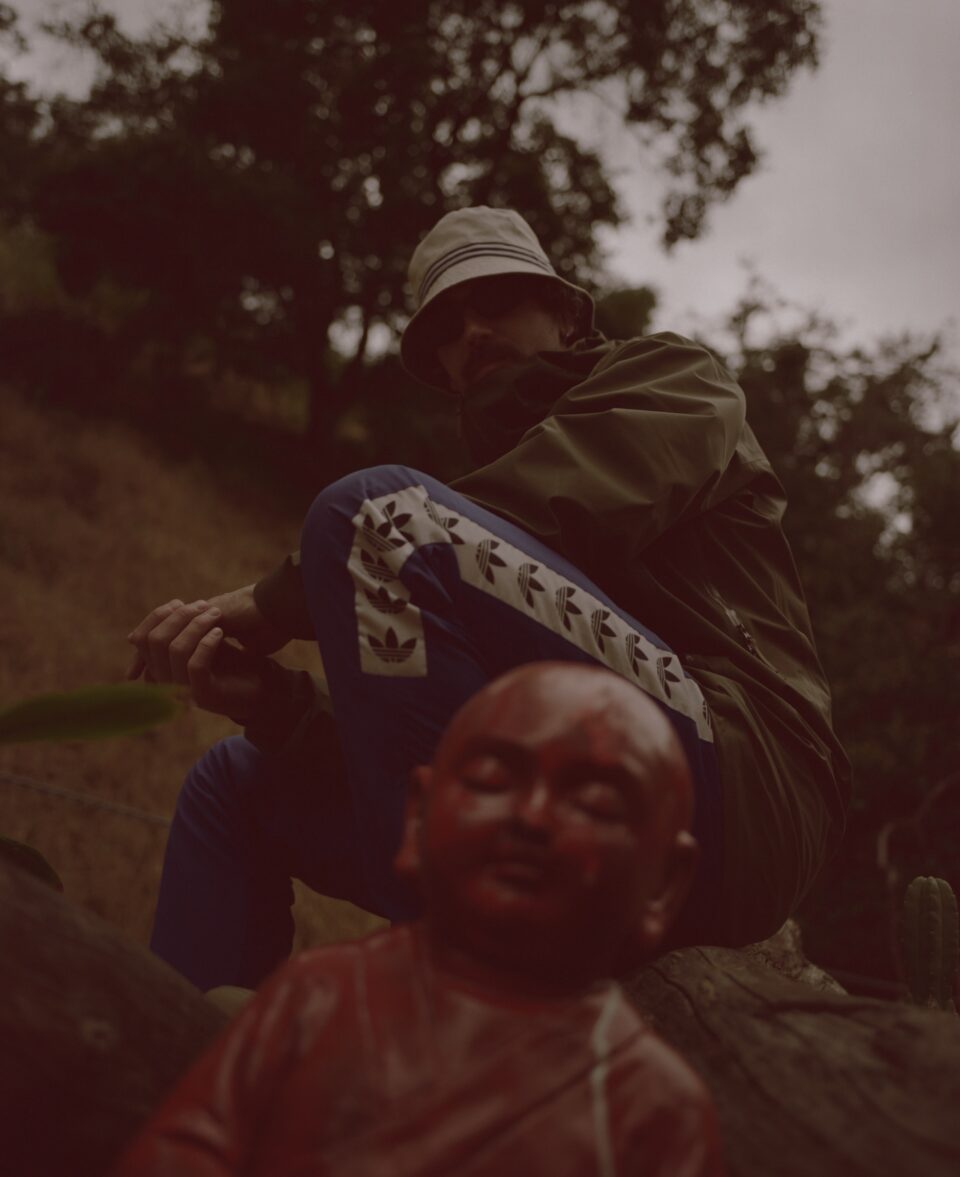
Gourley met up once with Rivers Cuomo of Weezer, and he learned the band leader worked with a very similar process. Like Gourley, Cuomo might finish one song by grabbing part of another, and then welding them together. “I live my life by Weezer's Blue album,” Gourley says. “An album is a snapshot in time of this moment and this life and this experience. Let it bleed into each other. Don't be so precious. Cannibalize all of it.”
For Chris Black Changed My Life, Portugal. The Man turned to producer Jeff Bhasker, a five-time Grammy winner, including for 2016’s Producer of the Year. Over the years, he’s worked on Kanye West’s classic 808s and Heartbreak and collaborated successfully with Beyonce, Jay-Z, Taylor Swift, Harry Styles, Pink, Fun and more.
A lot of the initial tracking was done in houses in Portland, where the band has been based since forming in 2004. They then hit a couple more studios in Los Angeles, then stopped by New York’s Diamond Mine studio, where the Dap Kings once recorded. As ever, Gourley embraced collaboration, a modern tradition of hip-hop. All good ideas were welcome, and the singer would happily hand the mic to someone else, as he did during “Summer of Luv” with Ruban Nielson from Unknown Mortal Orchestra, another Portland-based act. Sitting in on drums for several tracks is Homer Steinweiss of the Dap-Kings, band of the late Sharon Jones.
“There’s this weird idea that you need to be the sole creator of that thing,” says Gourley. “Don't put me in here expecting to write a hit song. Let's make good music. That was one of the first things Danger Mouse really laid on us: Let's just make a good record. That's the goal. That has stuck with me.”
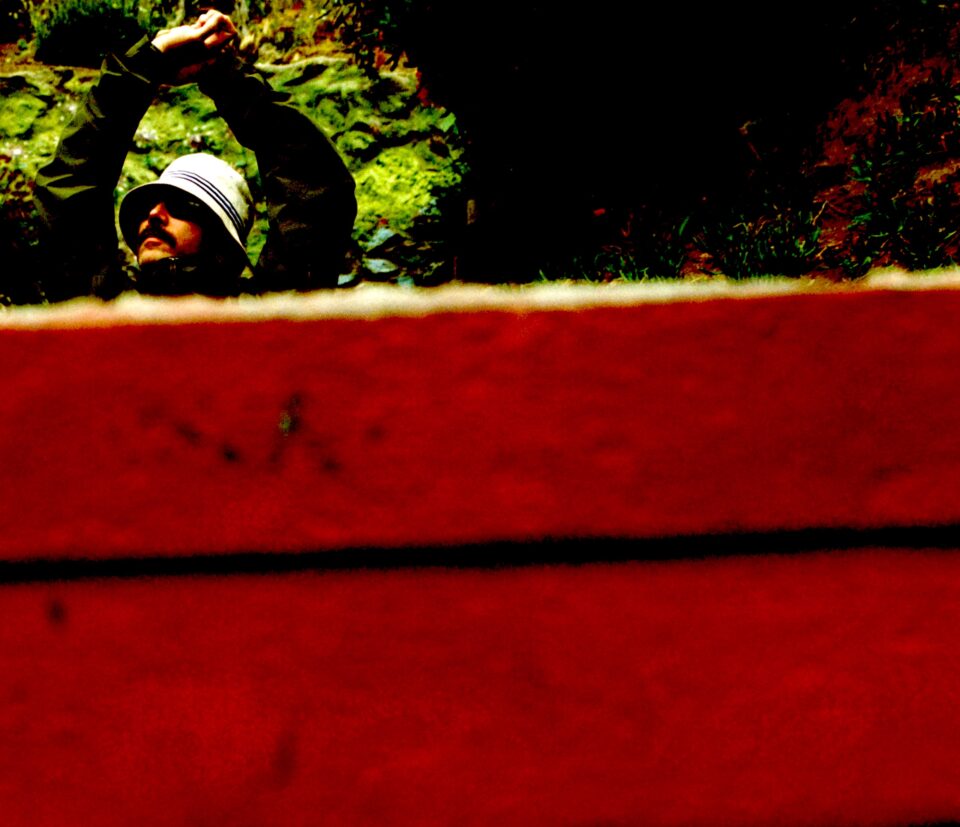
The collaborations also crossed generations. At one point he reached out to classic rocker Edgar Winter, whose massive ’70s rock hits included “Frankenstein” and “Free Ride.” They’d never previously met, but Gourley was fascinated by Winter’s aching “Dying to Live,” a song from 1971 that he incorporated into the curious soul groove of “Champ.” At the sessions, Winter sang a verse echoing his old ballad. That was followed by a raging sample from With War, an indigenous vegan hardcore band from Portland, that included the words: “Abolish everything that keeps Indigenous people from our natural vibrations/Indigenous peoples take back what’s ours!” Over a With War metal riff, layers of sax and cosmic keyboards were added by Winter.
Portugal. The Man also recruited songwriter Paul Williams, a hitmaker throughout the '70s with the likes of Three Dog Night and The Carpenters, and the star and composer of Brian DePalma’s cinematic rock opera Phantom of the Paradise. More recently, Williams shot back into the zeitgeist in 2013 as a songwriter and singer on Daft Punk's Grammy-winning blockbuster Random Access Memories. One year at the American Music Awards, Williams briefly met members of Portugal. The Man. Selfies were quickly shot and posted online, but the connection wasn’t over.

Kyle O’Quin

Zoe Manville
“Paul DM’s us immediately and he is like, ‘Would you guys like to work on some music?’” recalls Gourley, who responded, “‘Yes, sir, we would.’” Williams came up to Portland, making sure it happened, and they worked together for three days. Out of those sessions came “Dummy.”
While those music veterans carried a lot of history, what mattered was that they remained engaged with the present, says Gourley. All their previous hits and successes were secondary to the task in front of them, no more relevant than the recent accolades and prizes Portugal. The Man picked up for Woodstock. “At the same time, I do watch people being nostalgic for the thing that they had, you know? I think it naturally happens. You think, ‘My era was the greatest era.’ But the second you're like, ‘Do you see my Grammy over there? I do have a Grammy’—the second you have that feeling, it’s done.”
After the photo session ends, Gourley sits on the edge of the park to talk. News broke earlier that day that Tina Turner died at 83. On the album is a song called “Thunderdome [W.T.A.],” a track of hip-hop textures, with guest vocals from Black Thought and Natalia Lafourcade. The song of course was inspired by the example of Turner, a powerhouse singer of rock and soul who co-starred in the 1985 post-apocalyptic movie Mad Max Beyond Thunderdome.
“She’s bad as hell, man. Her whole story is so wild,” Gourley says with a smile. “Why do you think I sing so high? All those female singers—growing up, I was just like, that’s way more badass.”

More than ever, Gourley sees his band’s new album as a complete work, not just a collection of songs, that he wants to deliver live to the world. “I want to do the whole record. I've never felt like that,” he says. “It was weird. We went into the studio and I was like, this feels so natural to play. Not all of our records feel like that.”
It’s also the first album since the rest of the world discovered this band with the confounding name. Among rock artistes, it’s a rare musician that considers a big hit their greatest work from a full career of records, and Portugal. The Man had already built an audience of devotees over years of albums and tours. Gourley is at least willing to consider it in the case of “Feel It Still,” he says. “The second I saw a baby dancing in his car seat to it, it took me straight back to Alaska and when I was a little kid. It was like a time machine for me. I'm in the car … on a trip and I'm experiencing something for the first time. It's that door opening up. And I love a door opening up.” FL
